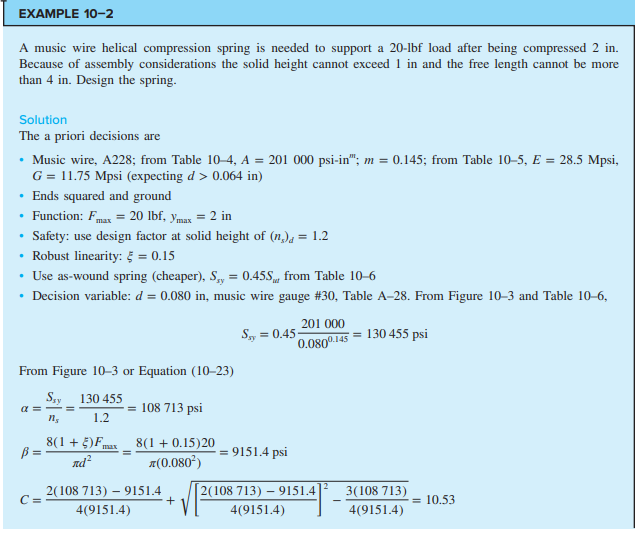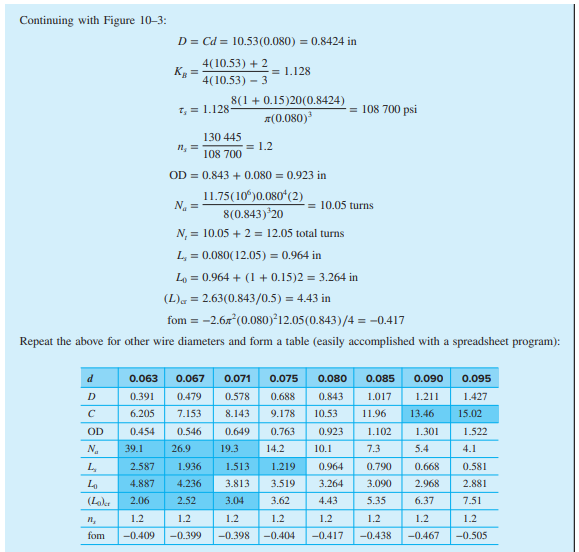Answered step by step
Verified Expert Solution
Question
1 Approved Answer
EXAMPLE 10-2 A music wire helical compression spring is needed to support a 20-lbf load after being compressed 2 in. Because of assembly considerations



EXAMPLE 10-2 A music wire helical compression spring is needed to support a 20-lbf load after being compressed 2 in. Because of assembly considerations the solid height cannot exceed 1 in and the free length cannot be more than 4 in. Design the spring. Solution The a priori decisions are Music wire, A228; from Table 10-4, A = 201 000 psi-in"; m = 0.145; from Table 10-5, E = 28.5 Mpsi, G = 11.75 Mpsi (expecting d > 0.064 in) Ends squared and ground . Function: Fmax = 20 lbf, ymax = 2 in . Safety: use design factor at solid height of (n) = 1.2 . Robust linearity: = 0.15 Use as-wound spring (cheaper), S,, = 0.45S from Table 10-6 . Decision variable: d = 0.080 in, music wire gauge #30, Table A-28. From Figure 10-3 and Table 10-6, From Figure 10-3 or Equation (10-23) 201 000 Sy=0.45- 0.0800.145 130 455 psi Say 130 455 108 713 psi ns 1.2 B= 8(1+5)Fmax _ 8(1+0.15)20 9151.4 psi nd (0.080) 2(108 713) 9151.4 - 2(108 713) 9151.4 - C= 3(108 713) + =10.53 4(9151.4) 4(9151.4) 4(9151.4) Continuing with Figure 10-3: D= Cd = 10.53(0.080) = 0.8424 in 4(10.53)+2 4(10.53) - 3 KB = = 1.128 8(1+0.15)20(0.8424) 1,1.128- *(0.080) =108 700 psi 130 445 n = = 1.2 108 700 OD = 0.843 + 0.080 = 0.923 in 11.75(10)0.080*(2) N = 8(0.843)20 10.05 turns N = 10.05 + 2 = 12.05 total turns L = 0.080(12.05) = 0.964 in L = 0.964 + (1 + 0.15)2 = 3.264 in (L) 2.63(0.843/0.5) = 4.43 in fom = -2.6x(0.080) 12.05 (0.843)/4 = -0.417 Repeat the above for other wire diameters and form a table (easily accomplished with a spreadsheet program): d 0.063 0.067 0.071 0.075 0.080 0.085 0.090 0.095 D 0.391 0.479 0.578 0.688 0.843 1.017 1.211 1.427 C 6.205 7.153 8.143 9.178 10.53 11.96 13.46 15.02 OD 0.454 0.546 0.649 0.763 0.923 1.102 1.301 1.522 N 39.1 26.9 19.3 14.2 10.1 7.3 5.4 4.1 L 2.587 1.936 1.513 1.219 0.964 0.790 0.668 0.581 4.887 4.236 3.813 3.519 3.264 3.090 2.968 2.881 (La)er 2.06 2.52 3.04 3.62 4.43 5.35 6.37 7.51 n, 1.2 1.2 1.2 1.2 1.2 1.2 1.2 1.2 fom -0.409 -0.399 -0.398 -0.404 -0.417 -0.438 -0.467 -0.505 Now examine the table and perform the adequacy assessment. The shading of the table indicates values outside the range of recommended or specified values. The spring index constraint 4 < C < 12 rules out diameters larger than 0.085 in. The constraint 3 N 15 rules out wire diameters less than 0.075 in. The L, 1 constraint rules out diameters less than 0.080 in. The Lo -0.438).
Step by Step Solution
There are 3 Steps involved in it
Step: 1

Get Instant Access to Expert-Tailored Solutions
See step-by-step solutions with expert insights and AI powered tools for academic success
Step: 2

Step: 3

Ace Your Homework with AI
Get the answers you need in no time with our AI-driven, step-by-step assistance
Get Started


